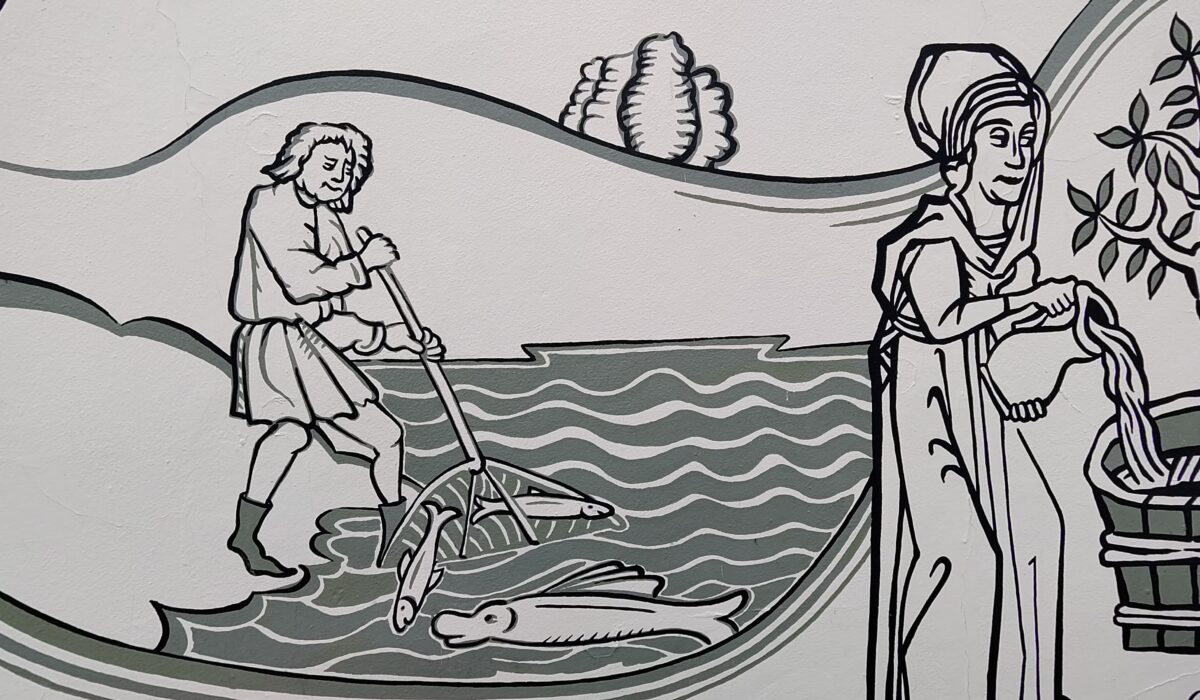
Restoration efforts to protect eel migration routes
In addition to over and illegal fishing, barriers such as locks, weirs, and dams significantly impact the European eels’ ability to migrate. These barriers restrict the eels’ movement both up and downstream, so much so that it is common practice for fishers to carry out re-stocking of rivers – where juvenile eel are transported between rivers and around barriers. The multi-million pound Unlocking the Severn project is taking fish protection measures one step further. The project seeks to restore connectivity of the River Severn and aid migratory fish on their journey by building fish passes along approximately 158 miles of the river.
To see how the project is developing, Dr Alison Hutchinson visited the Diglis weir fish pass and underwater viewing gallery in Worcester. At one hundred meters long, eight meters wide, and five meters deep, it’s the largest of its kind in England and Wales. A series of eleven ascending pools allow fish to slowly travel upwards in manageable steps. Each pool is shaped in ‘c-sections’ to manage the speed of flow and provide resting areas for fish as they swim against the current. Since its completion in 2021, twenty-two species of fish have been recorded using the fish pass, including the European eel and other threatened species (the twaite shad, salmon, and lamprey). Although no eels were spotted on this visit, they can generally be found heading upstream from March onwards and begin their return journey from September to December – so a return visit may be on the cards for the Beastly Business team!
A de-eel-ectable eel?

Following her visit to the Diglis weir fish pass, Alison also visited the Frampton County Fair, home to a decades’ old tradition of competitive elver eating. Elvers (immature eels) are fished as they begin their river migration and are considered both a delicacy and acquired taste. However, the scarcity of elvers in the Severn today has meant that the competition now goes ahead using imitation eels made from surimi – a fish product made from ground cuttlefish paste (or other species of white fish).
Although the crowds at the Countryside Ring were packed for the falconry demonstration, volunteers for the el-ver eating competition were reluctant to come forward (possibly enticed away by the parade of hounds taking place at the same time in the Main Ring). Eventually eight contestants volunteered, mostly children, but also last years’ winner and someone who had travelled all the way from London just to eat eels. To begin, the competition’s judge briefly described how barriers have hampered the migration of the eel and the numbers of locally available elvers (the impact from fishing was left unspoken). Then, with a celebratory reveal of the substitute el-vers, the rules were outlined: you must eat everything on your plate, nothing on the floor or on the table – fastest wins.
And so, the competition began – with lots of squirming from both competitors, and the bemused yet captivated audience. The elver, although present only in a reconstituted fish from, is normally considered delicacy and savoured by those who eat them. But in competitive eating circles, as their el-ver likenesses are reluctantly guzzled down – and bits spew across the table and grass below (despite competition regulations) – their apparent charm as a highly desirable and sought-after food appears forgotten. The reigning champion was not put off by the slippery el-ver ‘bodies’, quickly finishing his plate before the others had made much of a dent. He was awarded a trophy for his troubles, but his idea that he was now the ‘world champion’ was quickly corrected, as the judge revealed this was just a promo event for the main competition which is held in the village in May.
Contestants’ concerns for the elver may have been pacified by the ‘eco-friendly’ surimi provided – its use certainly provides a way for the town’s historic competition to continue. As with all traditions, as long as people enjoy taking part as competitors or spectators, then the speedy consumption of piles of elvers (sorry – reconstituted fish) looks set to continue.


